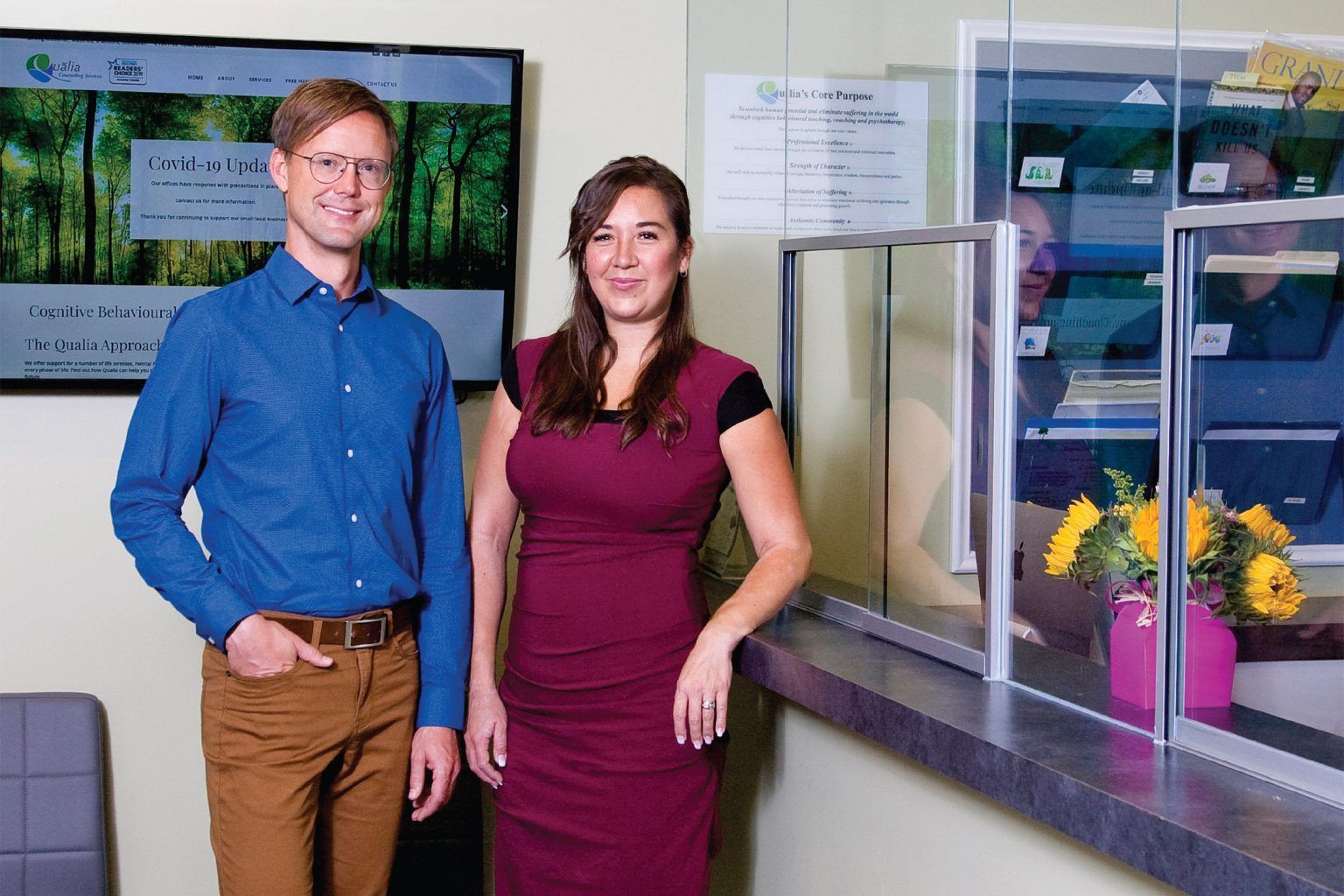Combating Trauma During COVID-19

2020 has been an interesting, challenging and even a traumatic year. Charity Fleming, a Cognitive Behaviour Therapist and co-owner of Qualia Counselling Services, has been using the psychological concept of Posttraumatic Growth to help people grow from their difficult experiences of COVID-19. Fleming has based this current work on her new and cutting-edge CBT for Trauma program which she is currently launching in partnership with Wilfrid Laurier University. This program aims to bring rigorous trauma and posttraumatic growth training to Canada.
“Not everyone has mental illness, but we all need to nurture our mental health and well-being” Fleming says. Fleming shares that Cognitive Behaviour Therapy (CBT) is much like personal training for our brain, as CBT enhances neuroplasticity and strengthens neural pathways all of which leads to increased mental flexibility, adaptability and well-being. “CBT is one of the most evidence-based strategies for psychological healing and growth; helping individuals to accomplish goals like decreasing anxiety, overcoming trauma, losing
weight, and even improving leadership skills.”
Working alongside Thomas Brown, Qualia’s other owner and founder, Brown and Fleming lead their staff in four mental health clinics and as instructors with Wilfrid Laurier to provide CBT treatment and teaching. “We’ve dedicated our professions and lives to advancing access to CBT in communities along the Grand and all the nation.” Due to COVID, Qualia has bolstered its capacity to offer its services both traditionally and virtually, making access to CBT flexible, accessible and safe.
Combating Trauma During COVID-19
Whether it’s COVID-19, supporting an anxious child, a clinical mental illness or a stressful job, life is challenging and even traumatic. Over the past 10 years Qualia has worked diligently through its innovative CBT programs, like Fleming’s new CBT for Trauma program, to help its clients and trainees to overcome life’s challenges, embrace opportunities for growth, and unlock their true potential.
(View article as it appeared in The Record, below. Or scroll past this view, to see the 2nd half of the article)
Training to Meet the Need for Trauma-Focused Therapy
To treat unique needs across the country, a Canadian context matters. And that concept led to arguably most comprehensive CBT (cognitive behaviour therapy) for Trauma training in Canada.
“I recognized there’s a huge need for CBT for Trauma training, especially in the Canadian population,” says Charity Fleming, registered social worker, psychotherapist and co-owner of Qualia Counselling Services, which has four mental health clinics across Southern Ontario.
“Around 76 per cent of the Canadian population has experienced trauma, which is much higher than other countries,” she says, citing a startling figure: Canada was No. 1 of 24 countries for prevalence of traumatic experiences and PTSD symptoms.
Although trauma-focused CBT (TF-CBT) is considered “the gold standard” in the United States, Fleming says less than a handful of training opportunities existed for Canadian practitioners, and typically only two or three days in length.
“That’s really where [the program] came from — a response to those needs, and recognizing this is something a lot of people experience,” Fleming says.
Developed for a Canadian Context
Why are Canadian trauma figures so high? We have larger communities that are more likely to have experienced trauma, Fleming says — Indigenous, refugee and immigrant populations.
“I’m an Indigenous woman and I’ve worked in First Nations for a long time,” she says. “There’s a high prevalence of historical trauma, suicidality and other mental health problems, compounded from the history of colonialism.”
“We’re really committed to the Truth and Reconciliation Calls to Action,” she adds, “so part of the program is teaching the Canadian population about historical trauma within First Nations.”
As a complex condition that can affect anyone — from a refugee to first responder, a domestic abuse survivor to car accident victim — living with trauma can disrupt a person’s entire life. The potential effects of untreated trauma can be crippling, Fleming says: anxiety, depression, hypervigilance, dissociation, flashbacks, personality disorders, risktaking and revictimization, substance abuse, and suicidality.
Untreated trauma can even spread through families, generations and communities. It travels to children via changes in DNA; parents or caregivers with PTSD have increased risk of addictions and emotional issues; and children may be exposed to risky situations or develop their own psychological problems.
“We see trauma a lot in our clinics,” Fleming says, “and it can really impair people’s functioning.”
Highlights of the CBT-T (for Trauma) Training Course
The good news, Fleming says, is that CBT for trauma remains one of the most evidence-based and scientifically proven treatments for this complex issue. Neuroimaging and MRI scans have shown
improvements on the brain following intervention, and it was awarded the highest ranking of empirical support in a report sponsored by the U.S. Department of Justice.
This innovative CBT-T training program, in partnership with Wilfrid Laurier University, is “much more rigorous than anything else offered” in Canada, Fleming says. It spans over 12 weeks and totals 36 hours — by comparison, other training typically runs 12 to 18 hours.
“The second feature is that it’s very Canadian in context,” she says. “It’s teaching about historical trauma in Indigenous populations, about refugee trauma, and other traumas that are specific to Canada — and using Canadian statistics.”
The third standout feature is that training is geared toward both adults and children, while the TF-CBT training in the U.S. focuses on children.
“With such a high prevalence of trauma, my hope is that [mental health professionals] can be well trained and the clients that they’re seeing — people all over Canada — can recover from trauma,” Fleming says.
The last highlight of this CBT-T training program is about the next chapter in clients’ lives, she says — how recovery can actually lead to growth.
“There’s going to be a focus on post-traumatic growth, where people can identify how they’re heroes and cycle-breakers of their own life stories,” Fleming says. “They can rise above the difficulties they’ve encountered and even grow — become stronger, better, happier people because of the trauma, not just in spite of it.”
For more information about the training course, visit qualiacounselling.com. To register, visit Wilfrid Laurier University’s course site.
The post Combating Trauma During COVID-19 appeared first on Qualia Counselling.
Share This Post on Social Media!




